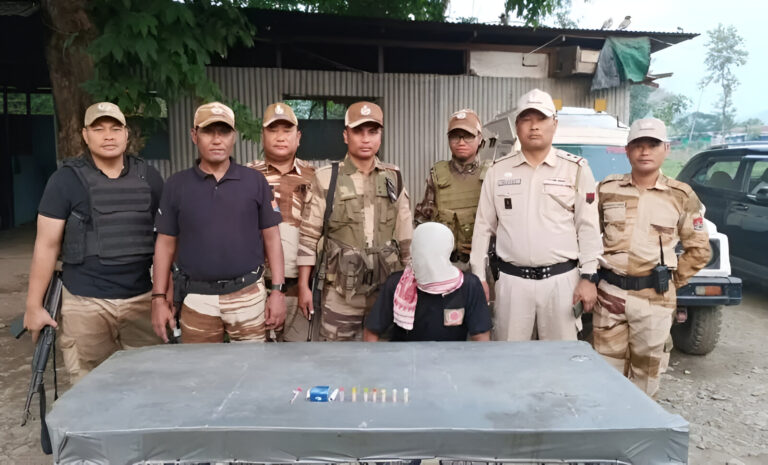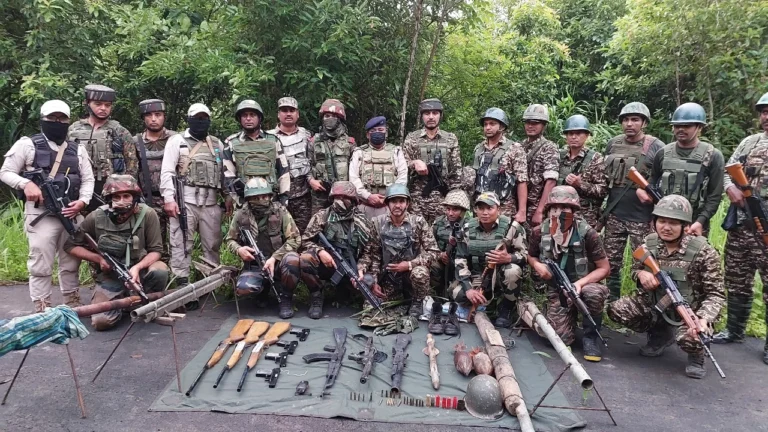Assam Rifles Destroys Illicit Poppy Cultivation in Manipur
Short Summary
The Assam Rifles recently executed a decisive operation in Manipur, targeting and dismantling illicit poppy cultivation that threatened the stability and well-being of local communities. This action not only underscores the relentless commitment of Indian security forces in curbing illegal narcotics production but also sends a strong message against the networks that profit from these dangerous activities. By striking at the roots of illicit trade, the operation aims to restore safety, promote lawful livelihoods, and safeguard the region’s future.
Long Article:
Introduction: Unveiling a Bold Operation
In the heart of Northeast India, where the rugged terrain and lush landscapes often mask hidden challenges, the Assam Rifles have once again shown their mettle. The recent operation in Manipur aimed at dismantling illicit poppy cultivation is a testament to their unwavering commitment to national security and public safety. But what exactly does this operation entail, and why does it matter so much? Let’s dive into the details and understand the layers of this significant event.
The Background of Illicit Poppy Cultivation in Manipur
Manipur, with its picturesque hills and valleys, has unfortunately also been a fertile ground for clandestine activities. Poppy, the primary source for opium, has a long and controversial history in many parts of Asia. In regions like Manipur, its illicit cultivation not only fuels a dangerous drug trade but also jeopardizes the socio-economic fabric of local communities.
Imagine a beautiful garden that, over time, becomes infested with weeds—this is much like how poppy cultivation, when left unchecked, can disrupt the natural growth and prosperity of a community. With local populations often caught in the crossfire between criminal networks and enforcement agencies, the stakes are incredibly high.
The Role of Assam Rifles: Guardians at the Frontier
The Assam Rifles, one of India’s most decorated paramilitary forces, are no strangers to complex terrain and challenging operations. Their role in this recent mission highlights their dual function: protecting the country’s borders and ensuring internal security. Their expertise, honed over decades, was crucial in tracking down and eliminating the illicit poppy fields that threatened to undermine the rule of law in Manipur.
Operating with precision, the Assam Rifles coordinated with local police forces and intelligence agencies. Their strategy was both proactive and reactive, designed to strike hard at the heart of the illegal cultivation network while ensuring minimal disruption to law-abiding citizens. Think of them as the skilled gardeners who not only remove invasive weeds but also nurture the growth of a healthy, sustainable ecosystem.
A Step-by-Step Look at the Operation
Let’s break down the operation into digestible steps, almost like following a recipe for success:
- Intelligence Gathering:
Before any boots hit the ground, there was extensive intelligence work. Local informants, surveillance operations, and even aerial reconnaissance helped map out the illicit poppy fields. This was akin to solving a complex jigsaw puzzle where every piece mattered. - Planning and Coordination:
With detailed intelligence in hand, commanders planned a coordinated strike. This involved synchronizing the efforts of ground troops with local police, ensuring that every movement was precise and every risk minimized. The planning phase was as meticulous as preparing for a major sporting event, where every player knows their role. - The Raid:
Under the cover of the rugged Manipur terrain, the Assam Rifles moved in. The raid was swift and effective, with forces dismantling the poppy cultivation setups, confiscating the crops, and neutralizing any threats that might have been lurking in the shadows. It was a high-stakes game of hide and seek where the security forces emerged victorious. - Post-Operation Measures:
After the successful raid, efforts shifted towards ensuring that the region remained secure. Local communities were reassured, and plans for ongoing surveillance were set in motion to prevent any resurgence of illicit activities. This stage was all about rebuilding trust and stability—like tending to a garden after uprooting invasive species.
Understanding the Broader Implications
Why is this operation such a big deal? The destruction of illicit poppy cultivation is more than just a tactical victory; it has profound implications for the community, the state, and the nation as a whole.
- Economic Impact:
Illicit poppy cultivation often promises quick money to desperate farmers, but it also traps them in a cycle of dependency on illegal trade networks. By dismantling these operations, the government paves the way for more sustainable and legitimate economic opportunities. It’s like cutting off the weeds that strangle the life out of a young sapling, allowing it to grow into a sturdy tree. - Social and Community Welfare:
The negative effects of drug trade permeate communities, fostering an environment of fear, corruption, and lawlessness. By addressing the source of this menace, the operation helps restore social order and public confidence. Families can sleep peacefully at night knowing that their children are less likely to fall prey to the lure of illegal narcotics. - National Security:
Beyond the immediate local benefits, actions like these send a strong message to those involved in drug trafficking and insurgency. The government’s zero-tolerance policy acts as a deterrent against future criminal endeavors, reinforcing the idea that illegal activities will not be tolerated.
Economic Transformation: A Path to Sustainable Livelihoods
One of the most critical issues surrounding illicit poppy cultivation is the economic desperation that often drives local farmers into illegal activities. When legal avenues for earning a living are scarce, the lure of quick profits from poppy can be hard to resist.
Imagine a small village where every farmer struggles to make ends meet—when an illegal crop promises immediate cash, it can seem like a lifeline. However, the long-term consequences can be devastating, leading to cycles of poverty and criminal involvement. The operation by the Assam Rifles is a step toward breaking this cycle. By removing the source of illegal income, the government can focus on providing better support, education, and alternative livelihood programs for these communities. In essence, it’s not just about destroying a crop; it’s about cultivating a future where communities thrive legally and sustainably.
The Human Element: Impact on Local Communities
While the technical details of the operation are important, we must not overlook the human stories behind them. Local communities in Manipur have long suffered due to the spillover effects of illicit activities. Families often face uncertainty, with their children sometimes drawn into dangerous circles of drug abuse and criminality.
When the Assam Rifles stepped in, it was a moment of hope—a promise that the cycle of crime and despair might finally be broken. The operation has boosted local morale, reinforcing the belief that law enforcement is on their side. It’s like a community finally seeing the light at the end of a dark tunnel, where the promise of a better tomorrow begins to take shape.
Environmental Considerations: The Hidden Benefits of the Operation
At first glance, one might wonder how an operation targeting poppy fields has any bearing on the environment. However, consider this: when illegal crops replace natural vegetation, they not only disrupt the local ecosystem but also lead to unsustainable farming practices.
Illicit poppy cultivation often involves the use of harmful chemicals and unsustainable irrigation practices, which can degrade soil quality and deplete natural resources. By clearing these fields, the operation paves the way for environmentally friendly practices that promote biodiversity and soil health. In a way, the Assam Rifles are not just fighting crime—they are nurturing the land for future generations.
The Strategic Importance of Manipur
Manipur’s geographical location makes it a critical area for both economic and security reasons. Bordering countries with complex political dynamics, the state has long been a hotspot for cross-border smuggling and insurgency. The illicit poppy cultivation is just one facet of a broader set of challenges faced by the region.
By successfully targeting these illegal operations, the Assam Rifles are strengthening the state’s defenses against external and internal threats. It’s akin to fortifying a castle wall, ensuring that any potential invaders are met with formidable resistance. This operation is not an isolated incident; it is part of a comprehensive strategy to secure one of India’s most sensitive and strategic regions.
Government Policies and the Fight Against Illicit Trade
The operation also reflects the broader policy framework adopted by the Indian government to tackle illegal narcotics production. Over the years, various measures have been implemented to curb the cultivation of opium poppies and related illicit activities. These include:
- Strengthening Border Controls:
Improved surveillance and patrolling along the borders have been key in intercepting smuggling activities. Enhanced cooperation between central forces and local authorities has played a vital role in these efforts. - Alternative Livelihood Programs:
Recognizing that economic desperation is a driving factor behind illicit cultivation, the government has initiated programs aimed at providing farmers with viable alternatives. By promoting crops that are both profitable and sustainable, these programs are designed to reduce the dependency on illegal trade. - Awareness and Community Engagement:
Education and awareness campaigns are crucial in ensuring that local populations understand the dangers of illicit drug trade. By engaging community leaders and offering support services, the government is working to create a more informed and resilient society. - Legal and Judicial Measures:
Strict penalties for those involved in the cultivation and distribution of illegal substances serve as a deterrent. The judicial system, backed by comprehensive law enforcement operations, ensures that those who break the law are held accountable.
These policies work in tandem with operations like the one in Manipur, creating a robust framework to combat the multifaceted challenges of illicit trade. The Assam Rifles’ actions are a visible manifestation of these policies in action—a signal that the government is serious about protecting its people and resources.
Community Resilience: Stories from the Ground
It’s one thing to read about an operation in a news article, but the real impact is felt by the people on the ground. Residents of Manipur have expressed relief and renewed hope following the operation. Local leaders and community members have shared stories of how the presence of illicit cultivation had sown seeds of fear and uncertainty among them.
Now, with the poppy fields dismantled, there is a palpable sense of optimism. Community meetings and local gatherings have started discussing plans for sustainable development projects, education initiatives, and better agricultural practices. It’s as if a heavy fog has lifted, revealing the bright horizon of possibilities. The success of the Assam Rifles’ mission has become a rallying point for the entire community—a symbol of resilience and the collective will to rise above adversity.
Challenges and Future Outlook
While the recent operation is undoubtedly a victory, it also brings to light the challenges that lie ahead. The battle against illicit cultivation and drug trafficking is far from over. Criminal networks are known for their adaptability, often shifting their strategies when confronted by robust law enforcement. So, what does the future hold?
- Continuous Vigilance:
The success in Manipur sets a strong precedent, but it also calls for constant vigilance. The Assam Rifles and other law enforcement agencies must remain alert to any signs of resurgence. Continuous monitoring and regular patrols will be crucial in ensuring that the illicit networks do not find a foothold again. - Expanding Support Systems:
It is essential to support local communities through education, healthcare, and economic development programs. By addressing the root causes of why illicit cultivation takes root in the first place, the government can create an environment where legal, sustainable practices flourish. - Technological Integration:
Embracing new technologies for surveillance, data analysis, and communication can further enhance the effectiveness of operations. Drones, satellite imagery, and advanced analytics can serve as powerful tools in predicting and preventing illegal activities. - Strengthening Interagency Collaboration:
The success of such operations often hinges on seamless collaboration between various agencies—local police, intelligence units, and national security forces. Strengthening these bonds and ensuring effective communication will be key in tackling the evolving challenges of illicit trade. - Global Implications:
Lastly, it’s important to recognize that the fight against illicit drug cultivation has international dimensions. By demonstrating a strong stance against such activities, India not only protects its borders but also contributes to the global effort against drug trafficking and organized crime. This operation sends a clear message to international criminals: India is a force to be reckoned with.
Conclusion: A New Chapter in the Fight Against Illicit Trade
The dismantling of illicit poppy cultivation in Manipur by the Assam Rifles is more than just a military or law enforcement victory—it is a beacon of hope for communities that have long suffered under the shadow of illegal narcotics. This operation stands as a powerful reminder that when determination meets strategy, even the most deeply entrenched problems can be overcome.
The ripple effects of this success are far-reaching: from bolstering local economies and protecting public health to strengthening national security and fostering a sense of community pride. As we look to the future, it is clear that the road to a safer, more prosperous Manipur—and indeed, a safer India—requires ongoing effort, collaboration, and an unyielding commitment to the rule of law.
In the end, the fight against illicit trade is much like tending to a garden. It requires constant care, vigilance, and the willingness to remove the weeds that threaten to choke the life out of the land. With the Assam Rifles leading the charge, there is renewed optimism that this garden will bloom with the promise of a brighter, more secure future for all.
Frequently Asked Questions (FAQs)
1. What prompted the Assam Rifles to target illicit poppy cultivation in Manipur?
The operation was initiated in response to growing concerns over the negative socio-economic and security impacts of illicit poppy cultivation, which fuels illegal drug trade and destabilizes local communities.
2. How did the Assam Rifles conduct the operation?
The operation involved extensive intelligence gathering, meticulous planning, coordinated raids with local police, and post-operation measures to ensure the sustainability of the region’s security and development.
3. What are the broader implications of dismantling illicit poppy fields in Manipur?
Removing these illegal operations not only curbs the drug trade but also opens up opportunities for sustainable economic development, restores community trust, and strengthens national security measures against organized crime.
4. How will local communities benefit from this operation?
Local communities are likely to experience improved safety, reduced exposure to criminal networks, and access to alternative, sustainable livelihood opportunities, thereby enhancing overall quality of life and economic stability.
5. What future measures are being considered to prevent the resurgence of illicit cultivation?
Authorities plan to implement continuous surveillance, strengthen interagency collaboration, promote alternative livelihood programs, and utilize advanced technology to monitor and prevent any potential resurgence of illegal activities.



